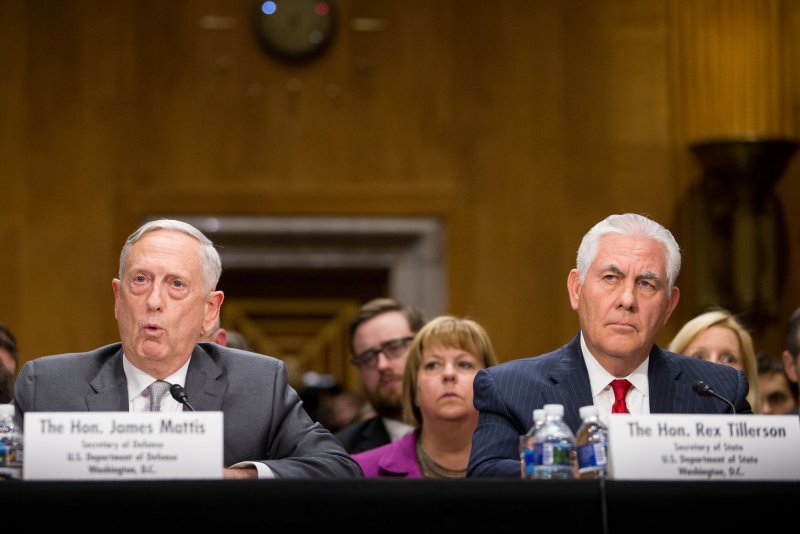Secretary of Defense James Mattis (left) and Secretary of State Rex Tillerson testify during a Senate Foreign Relations Committee hearing on "The Authorizations for the Use of Military Force: Administration Perspective" on Capitol Hill in Washington, D.C., on October 30, 2017. Photo by Erin Schaff/UPI |
License Photo
Oct. 31 (UPI) -- As the 16-year debate rages on Capitol Hill over the legal authority sending the U.S. military to combat, a new bipartisan bill proposes a new legal authority to replace active authorities that date back to President George W. Bush's administration.
On Monday, Secretary of Defense James Mattis and Secretary of State Rex Tillerson cemented the White House's reliance on a pair of 15-year-old authorizations for military force as the legal cornerstone permitting the executive branch to stage counter-terrorism operations.
A new authorization for the use of military force, or AUMF, has been proposed by Sens. Tim Kaine, D-Va., and Jeff Flake, R-Ariz., and is being considered by the Senate Foreign Relations Committee.
The new AUMF would seek to replace two previous ones, the 2001 AUMF signed seven days after the Sept. 11, 2001, terrorist attacks in the United States and the 2002 AUMF authorizing the invasion of Iraq. The two AUMFs, in addition to Article II of the U.S. Constitution, are seen by the Trump administration as legally authorizing the fight against the Islamic State in Iraq and Syria.
Senate Foreign Relations Chairman Sen. Bob Corker, R-Tenn., said their new AUMF would sunset after five years and require the administration to notify Congress if it sends troops to new areas of operation not listed in it.
"I think they've done a pretty good job in laying that out," Corker said of Kaine and Flake's AUMF proposal. "Members are going to want to express themselves, and Sen. Cardin and I are two members that are going to want to do that also. Again, I think that the only area to me that left somewhat of a debate was the associated forces issue and just whether an actual sunset versus reversing that out and giving Congress an ability to weigh in."
The "associated forces" issue refers to groups that align themselves with terrorist organizations named under the original AUMF, such as al-Qaeda and the Taliban.
Kaine and Flake's AUMF draft defines associated forces as any group that supports al-Qaeda, ISIS or the Taliban, and is engaged in hostilities against the United States. The bill also requires congressional notification when the administration adds a new terrorist group to the list.
Corker said he plans to hold more hearings on the issue in months to come, but admitted he sees little hope for progress.
"Moving ahead without significant bipartisan support would be a mistake in my opinion," Corker said. "And right now, we are unable to bridge that gap."
Senate Armed Services Committee Chairman John McCain, R-Ariz., said last week that he is working with Democratic members on crafting a bipartisan AUMF compromise, adding that he expects the results of those negotiations to be reveal in the near future.
"The next step most logically is to attempt to move to a markup and to actually try to pass an [authorization for the use of military force] out of committee," Corker said, noting that he plans to work with ranking member Sen. Ben Cardin, D-Md., to begin a draft "fairly soon."
"We want to discuss what provisions are most likely to make it through, but fairly soon," he said. "I don't know why we would wait. We had a great hearing. We had a good classified briefing. We all know the subject matter. If we're ever going to attempt to do this, I don't know why we would wait beyond the next several weeks."
Mattis and Tillerson told senators that a new AUMF should not be time or geographically constrained due to the metastasizing nature of foreign terrorist organizations, as well as to avoid telegraphing a timeframe of U.S strategy or when that strategy will cease.
"Generally speaking, you don't tell the enemy in advance what you're not going to do," Mattis told Republican Sen. Ron Johnson of Wisconsin. "There's no need to announce that to the enemy and relieve them of that concern."
"We must recognize that we are in an era of frequent skirmishing, and we are more likely to end this fight sooner If we don't tell our adversary the day we intend to stop fighting," Mattis said.
The secretaries told the Senate Foreign Relations Committee that the current 2001 AUMF, which was instituted seven days after the terrorist attacks of September 11, 2001, to authorize the Bush administration to go after al-Qaeda operatives and the Taliban in Afghanistan -- along with the 2002 AUMF for the Iraq War -- and Article II of the U.S. Constitution, give the Trump administration the proper legal authorities to fight the Islamic State in Iraq and Syria.
Mattis and Tillerson both testified to Congress, however, that if a new AUMF were drafted and passed, it should not repeal the current AUMFs until the new authorization is in place. The goal would be to avoid operational conflict and continue running of the detention center at the Guantanamo Bay Naval Base in Cuba.















